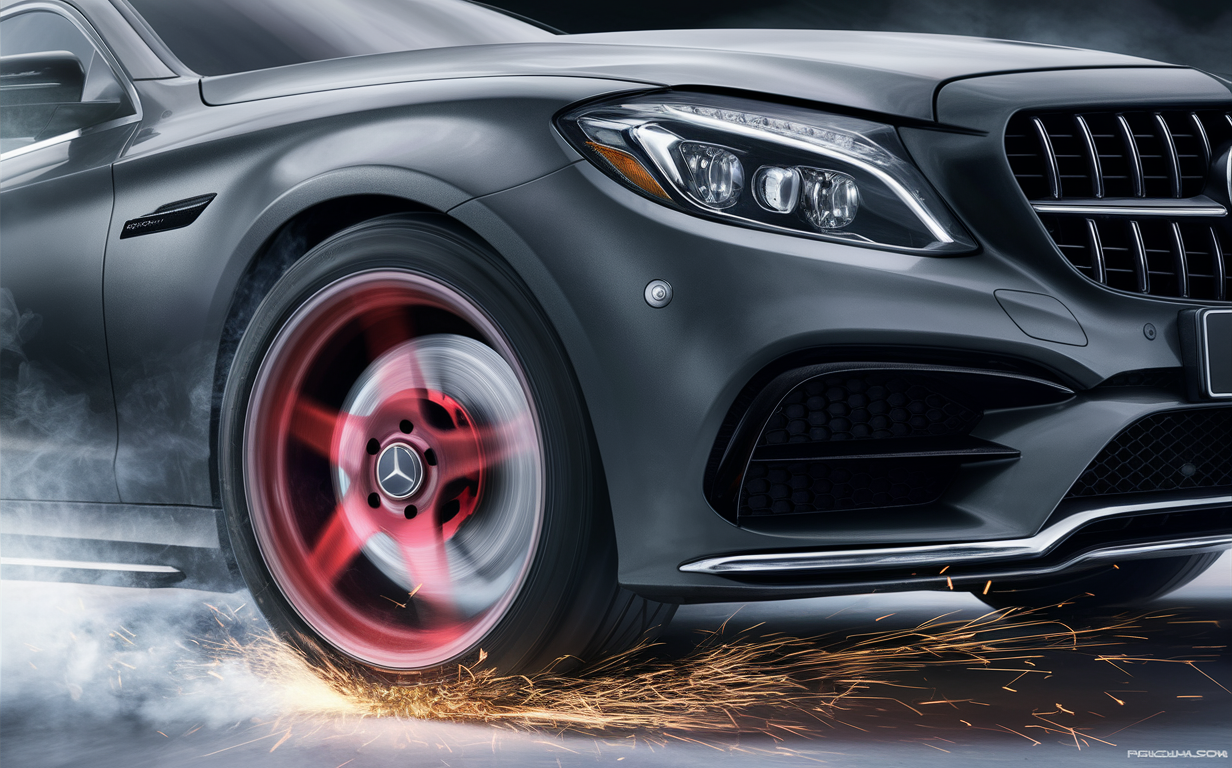Are you experiencing an unsettling Mercedes-Benz brake squeal that’s making your daily drives less enjoyable? You’re not alone. This common issue can be frustrating, but understanding its root causes can help you find the right solution. This article from Car Reviews & Guide will delve into the world of Mercedes-Benz brake squeal, exploring the reasons behind it, potential solutions, and how to prevent it from happening again.
What Causes Mercedes Benz Brake Squeal?
Brake squeal is a high-pitched noise that occurs when the brake pads rub against the brake rotors. While it might seem like a minor annoyance, it can indicate underlying issues with your braking system. Here are some common culprits:
Worn Brake Pads
Worn brake pads are a leading cause of brake squeal. As the pads wear down, the friction material becomes thinner, leading to vibrations and noise.
Note: Brake pads are designed to wear down over time. Regular inspections and replacements are crucial for maintaining optimal braking performance.
Glazed Brake Rotors
Over time, heat generated during braking can cause the brake rotors to become glazed. This smooth surface reduces friction, making the brake pads vibrate and squeal.
Note: Glazed rotors can be resurfaced or replaced to restore proper braking function.
Damaged Brake Components
Damaged brake components, such as warped rotors, cracked calipers, or loose components, can also contribute to brake squeal.
Note: Regular inspections by a qualified mechanic can help identify and address any damaged components.
Improper Brake Pad Installation
Incorrectly installed brake pads can lead to uneven wear and premature squealing.
Note: Always seek professional installation for brake pads to ensure proper alignment and optimal performance.
How To Address Mercedes Benz Brake Squeal

If you’re experiencing brake squeal in your Mercedes-Benz, it’s important to take action to prevent potential safety issues. Here are some steps you can take:
Seek Professional Inspection
The first step is to have your braking system inspected by a qualified mechanic. They can identify the root cause of the squealing and recommend the appropriate solution.
Note: Regular maintenance checks, including brake inspections, are essential for keeping your Mercedes-Benz in top condition.
Replace Worn Brake Pads
If worn brake pads are the culprit, replacing them with new ones will eliminate the squealing noise.
Note: Always use high-quality brake pads that are specifically designed for your Mercedes-Benz model.
Resurface or Replace Brake Rotors
If the brake rotors are glazed, they can be resurfaced to restore their friction surface. In some cases, replacement may be necessary.
Note: Resurfacing or replacing brake rotors should be done by a qualified mechanic to ensure proper alignment and safety.
Repair or Replace Damaged Components
Any damaged brake components, such as warped rotors or cracked calipers, should be repaired or replaced as soon as possible.
Note: Ignoring damaged brake components can lead to further issues and potentially compromise your safety.
Preventing Brake Squeal in Your Mercedes-Benz
Here are some tips to help prevent brake squeal in your Mercedes-Benz:
Regular Maintenance:
- Schedule regular maintenance checks for your braking system, including brake pad inspections, rotor checks, and fluid level checks.
- Note: Following the manufacturer’s recommended maintenance schedule can help prevent premature wear and tear.
Avoid Harsh Braking:
- Harsh braking generates excessive heat, which can lead to glazed rotors. Practice smooth braking techniques to minimize heat buildup.
- Note: Anticipating traffic conditions and braking early can help reduce the need for sudden stops.
Use High-Quality Brake Pads:
- Always use high-quality brake pads that are specifically designed for your Mercedes-Benz model.
- Note: OEM (Original Equipment Manufacturer) brake pads are often the best choice for maintaining optimal performance.
Address Issues Promptly:
- If you notice any unusual noises or vibrations, address them promptly. Ignoring minor issues can lead to more significant problems later on.
- Note: Early detection and repair can prevent costly repairs and ensure the longevity of your braking system.
Frequently Asked Questions about Mercedes-Benz Brake Squeal
What does brake squeal sound like?
Brake squeal is a high-pitched, metallic screeching sound that occurs when the brake pads rub against the rotors.
Is brake squeal dangerous?
While brake squeal itself isn’t dangerous, it can indicate underlying issues with your braking system. If left unaddressed, these issues can lead to more serious problems.
How much does it cost to fix brake squeal?
The cost of fixing brake squeal can vary depending on the cause and the extent of the repairs.
Note: It’s always best to get a quote from a qualified mechanic before proceeding with any repairs.
Can I fix brake squeal myself?
While some basic brake maintenance can be done at home, it’s generally recommended to seek professional help for any brake repairs.
Note: Improper brake repairs can compromise your safety and lead to further issues.
How often should I have my brakes inspected?
It’s recommended to have your brakes inspected at least once a year or every 12,000 kilometers.
Note: This can vary depending on your driving habits and the condition of your brakes.
Conclusion
Mercedes-Benz brake squeal is a common issue that can be addressed with proper diagnosis and repair. By understanding the causes, seeking professional help, and practicing preventative measures, you can enjoy smooth and quiet rides in your Mercedes-Benz. Remember, prioritizing regular maintenance and addressing any issues promptly can help ensure the longevity and safety of your braking system.

Related Posts
Mercedes-Benz Starter Problems: Causes & Troubleshooting Tips
Mercedes ECU Problems: Troubleshooting and Repair Guide
Coolant Too Hot Mercedes: Common Causes & Fixes